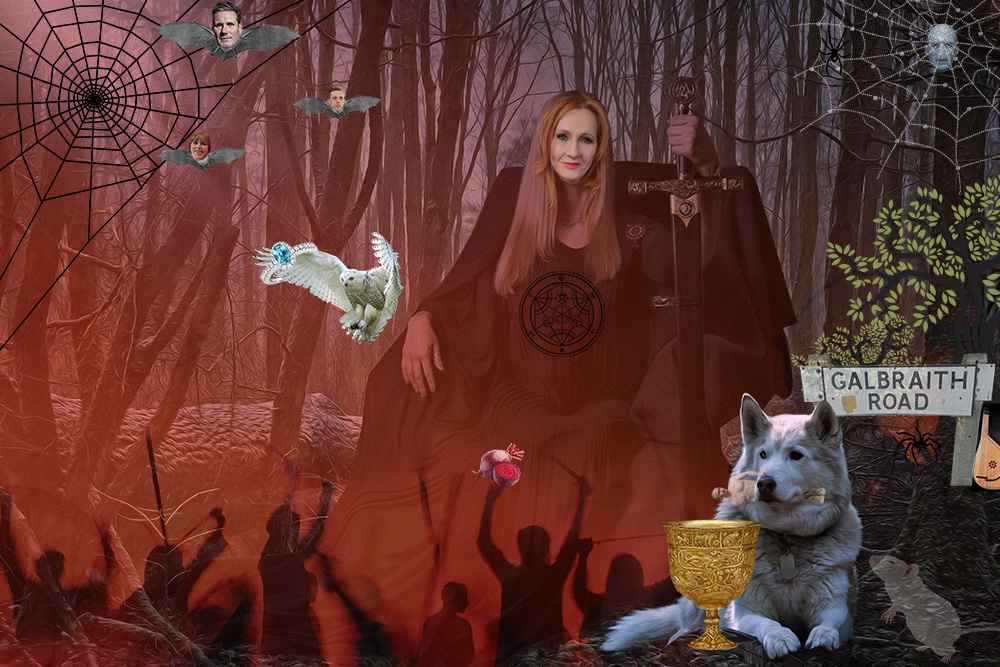Words are but symbols for the relations of things to one another and to us; nowhere do they touch upon absolute truth…through words and concepts we shall never reach beyond the wall of relations, to some sort of fabulous primal ground of things
– Nietzsche
Love looks not with the eyes, but with the mind
– A Midsummer Night’s Dream
J.K. Rowling is one of the most famous people in the world. In addition to known facts about her life, I formed a favourable impression of her at X. She is targeted for views she explains at her web site, which are not what people say about her. She is shielded with security, for which I am glad.
She started with books, Harry Potter specifically. It’s there where you find her character, although not separate from her advocacy. I hope I don’t get anything wrong, or annoy, but also think don’t worry. More than once, despite the nastiness she receives (which this isn’t) she speaks of forgiveness when people acknowledge error.
She uses the I Ching in one of her Galbraith novels and described how that happened. It was on her bookshelf, she picked it up casually, and became interested:
I had an old copy of the I Ching on one of my bookshelves that I bought second hand years ago, and I don’t think I’d ever opened until I was creating the UHC (a cult in her novel). One morning I walked past the book case and thought ‘that could be interesting.’ I immediately knew I wanted to use it…To tell you the truth, I became fascinated by the I Ching while writing the novel, and learned how to count out the yarrow stalks in the traditional way so I knew exactly how it worked (and when I say ‘worked’, I don’t claim it’s a divination device, but I do think it’s a very interesting tool for meditation and reflection).
I’ve no interest in persuading people about the I Ching, which Carl Jung expressed very well. If you want it, here it is: “Like a part of nature, it waits until it is discovered. It offers neither facts nor power, but for lovers of self-knowledge, of wisdom – if there be such – it seems to be the right book.”
I have no particular interest in Potter or Stark but enjoy her fan’s excitement: is he going to kiss Robin in the next book?! Reader, I don’t know. I’m more interested in J.K. Rowling, why she writes as she does, and how it can be understood with the I Ching. This is not singular to Rowling; I find creative people fascinating. Some years ago I photographed jazz musicians and remember our conversations as much as the images.
People say I don’t know how to refer to you. Joanne doesn’t quite work because you’re J.K. so a few people say Jaykay. You sort of know her, sort of don’t, mostly don’t because that means scanning across her years and beyond the confines of X. Few people are interested in that. Her enemies prefer post-it note impressions, likes and hates, screen-shot tertiary not primary source words.
She used the Wilhelm translation for The Running Grave. There’s a reason why it’s the most popular version of the book. It is both historically important and definitive. Subsequent books derive from Wilhelm. They vary, and I would say the closest for meaning and quality is the version by Jack Balkin: The Laws of Change: I Ching and the Philosophy of Life.
Wilhelm was spiritually inclined and receptive to China. He had access to authentic I Ching tradition in the form of Confucian scholar Lao Nui Suan. They worked together for ten years, producing the masterpiece which then impressed Carl Jung. Jung asked the book how would you describe yourself? The answer he received was The Cauldron (hexagram 50) meaning a place for spiritual nourishment.
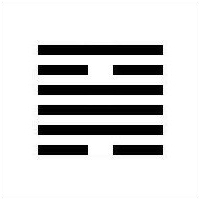
Before I proceed, I must contextualise the above. I am taking a literary approach to the I Ching, as Rowling does and Wilhelm inspires. It is a literary book. Like poetry, with imagery and suggestion. It is also a Taoist book where the words are secondary.
The I Ching describes energy, which can be connected with quantum theory if you find that philosophically interesting. See The Tao of Physics by Fritjov Capra, New Directions in the I Ching by Larry Schoenholtz. Read about field theory, systems theory, feedback loops, or the mathematics of Leibniz who was astonished with the I Ching. More simply, consider the reality of yin and yang.
Do you listen to what someone says (yin) or criticise them (yang). Do you want to be heard (supportive yin) or given advice (teaching yang). Who takes the initiative at home (yang) proposing the Christmas television to enjoy. In the case of J.K. Rowling it’s apparently her, with Bruce Willis and Die Hard. This is amusing conjecture. Perhaps her husband likes it too. But anyway, it’s not what you expect for J.K. Rowling.
Yin and yang mean active and passive, talking and hearing, hard and soft, and also male and female. Rowling once said she is “maternal.” Fans say they were comforted with the story of Harry who begins as the archetypal unrecognised child. Potter was an extraordinary literary achievement encouraging children to read. They did, millions of them, because they loved the books. Rowling still enjoys that aspect of her work.
One way of looking at the sixty four hexagrams is to consider them a framework of dynamic shifts which reflects life. This means danger, companionship, suspicion, relief, aloneness, silence, action, evil and good. Everything changes, none of this is permanent, and the six line symbols are temporary stations, or snapshots, of archetypal moments. Wilhelm himself takes this approach. In the centre section of his book he correlates hexagrams with character development.
How then did J.K. Rowling begin? Once upon a time, not long ago (thank you very much) she was born in Bristol and grew up in Gloucestershire. From what I understand her early life contained both stability and hardship which is suggestive of yin and yang. Comfortable house and home, but her mother was ill when she was 15.
This correlates with creativity and how it sometimes works. Nietzsche is a great philosopher but his notion of Superman did not reflect his life troubled with illness and unhappiness. He compensated with philosophy, giving to others while suffering himself, which is not ennobling but seems a creative reality.
Artists do this, like Van Gogh and even Orwell. He understood the dynamic (partly political) and exposed himself to homeless living to see what it was like. You can read in a library, but only if that world makes sense to you. W.B. Yeats, painfully distant from Maud Gonne, wrote beautiful words: solve et coagula because you have to.
Rowling wrote her first story at age six. Hexagram 52 is called Keeping Still or Mountain and describes stillness and introspection which partly describes the writing process and Rowling’s early life in regard to her later career. The same occurred with poet Mary Oliver who found meditative refuge in nature, translated into words; initially as an escape from her abusive home.
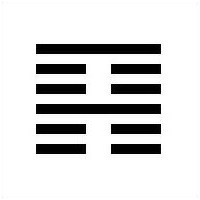
Rowling attended the University of Exeter for French and Classics which was not what her parents wanted, because they’re not vocational subjects. She spent a year in Paris which I find intriguing. Cafe conversation at the Left Bank? A morning croissant before lectures? Coffee at Les Deux Magots of Sartre and Simone de Beauvoir? Bien sûr, pour ce dernier.
After university she had various jobs, including researcher for Amnesty International. She described, years later, how one horrific moment was important for her past and present sensibility. An African man had fled his country, gained asylum in Britain, and was informed evil people at home had killed his mother because of his objection to the regime. She remembered his scream. You can almost hear it. Like a tear in the fabric of the world, emblematic of a darkness where such things happen.
In the I Ching, shock (see hexagram 51) can be internal or external. Hemingway pondered this subject with reference to war: “The world breaks everyone and afterward many are strong at the broken places” is a line from A Farewell to Arms suggesting Japanese kintsugi. But it’s not guaranteed. This is Tragedy, not Romance.
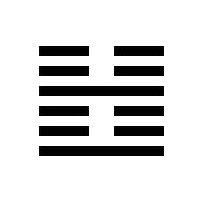
The word “evil” is used in the I Ching multiple times. Joanne must have been thinking Sartrean thoughts as every decent person would: what is this world? Harry Potter battles evil like Ged in The Wizard of Earthsea, Will in The Dark is Rising, Lyra Belacqua in His Dark Materials (the I Ching is part of it) and children in The Lion, the Witch and the Wardrobe where there is a beautiful conclusion:
Though the Witch knew the Deep Magic, there is a magic deeper still which she did not know. Her knowledge goes back only to the dawn of time. But if she could have looked a little further back, into the stillness and the darkness before Time dawned, she would have read there a different incantation.
The religious symbolism is apparent in Lewis but the theme is separate. Deep magic is one way (perhaps) of describing the I Ching. Except it’s not so much other worldly as the reality of living. Where, Rowling said at Harvard University in 2008, empathy for others is a moral key which expresses in imagination.
Rowling experienced struggling years of abuse, single motherhood and poverty but thanked her child as the reason for Harry Potter. Ponder what that means. She wrote with the sensibility for which her adoring fans describe her as “Queen.” This manifests as clever, kind, and funny remarks at X amidst a deranged ocean of nonsense. Do not however, mention beetroot.
Women and children are her focus because she knows their struggle. She built and funds Lumos and Beira’s Place, the latter citing the mother of all the gods and goddesses in the Celtic mythology of Scotland. Supportive yin occurs in many parts of the I Ching but is the archetype of hexagram 2. There is a wonderful film incidentally about unwanted children: Tashi and the Monk at the Jhamtse Gatsal Children’s Community. If the opening seconds from 30 to 50 do not make you smile, you are not human.
Hexagram 31 is called Influence describing the subtle effect someone has because of emotional resonance and empathetic connection: “A lake on the mountain: The image of influence. Thus the superior (person) encourages people to approach him by his readiness to receive them.” This person is receptive and willing to learn what the experience of another means, quintessential with an adult and child who lacks the necessary words. As a lake reflects its surroundings, so empathy means reflecting another.
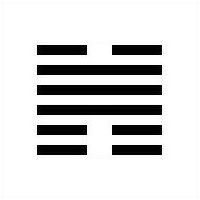
Empathy and kindness eventually win because that’s how the universe is structured. But this doesn’t deny harsh and bad experience: the yin and yang tapestry where hexagram 36 describes the problem: “The light has sunk into the earth: The image of Darkening of the Light” symbolised with the upper and lower trigram. Good and bad characters run throughout Rowling’s books, both Harry Potter and in her Robert Galbraith work.
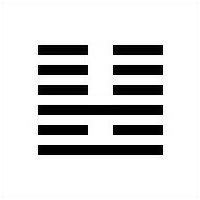
What is it like to keep writing when she could stop, put her feet up, reread Jane Austen, watch Bruce Willis, make peace with beetroot, and walk her dogs. She speaks of being driven saying she can’t “switch if off” so is hindered by the need for sleep. Her fans offered advice, not all of it legal or advisable.
Hexagram 16 is called Enthusiasm. This is similar to hexagram 1 whereby strong energy is positive but you must be careful with it. There are dangers of delusion at the top line, relying on three hours of sleep not eight. If two lines change from yin to yang (second and fifth) you arrive at the Exhaustion of hexagram 47. Or perhaps Enthusiasm means annoying other people: “Joanne! Come to bed!” is a faint cry occasionally heard in the night time mist of Scotland.
It depends which line(s) are operative in Enthusiasm. The ruling line however is the fourth for which Wilhelm advises “The source of enthusiasm. (S)he achieves great things. Doubt not.” The yang rises up but is solitary, and wants to maintain contact with the lower but complementary yin second: the centre of Earth thus the importance of nourishing food and sleep.
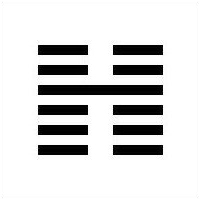
Harry Potter and the Philosopher’s Stone was initially rejected by several publishers who probably drowned their sorrow with drink for a year. Hexagram 3 applies: Difficulty at the Beginning. This sometimes corresponds to early life (Harry Potter) when we are inexperienced and confused; but is relevant in later life for any early stage project.
One of the commonly repeated expressions in the I Ching is “perseverance furthers” (li zhen). Bloomsbury accepted her first book in 1997 making her one of the most famous and successful writers in modern history. What is it like being J.K. Rowling navigating good and evil? She occasionally blocks people at X when they cross a line. Someone disrespected the reality of being disabled: that’s a block.
There are possibly two final relevant hexagrams. Hexagram 11 is called Peace which metaphysically means a harmonisation of Heaven and Earth (hexagrams 1 and 2) but in an ordinary sense signifies prosperity and security. This is interesting in relation to Rowling’s earlier precarious life in which respect she relaxes: although writes more now not less because she can freely do it. Heaven is an ideal and creative inspiration (hexagram 1) opposite to Earth materialisation (hexagram 2).
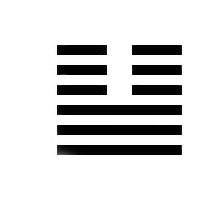
The ending of the I Ching is curious. Perfection occurs at hexagram 63 but it’s called After Completion. That reverses into hexagram 64 which is Before Completion. This reflects the instability of life where (Heraclitus also said this) nothing is permanent.
I prefer to consider Rowling in relation to archetypal themes found in literature. I’m not a political person and sense she isn’t either, but does advocate for some causes. Her ideas about gender are the reason for the hostility she receives, for which Hexagram 38 is called Opposition.
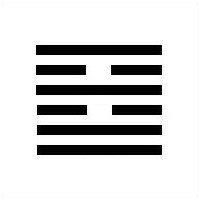
Delightful as it is, building a fantasy magical world, it is not reality where conflicts occur. Wilhelm advises for 38: “Above, fire; below, the lake: The image of Opposition. Thus amid all fellowship, the superior (person) retains his individuality.”
I have no idea what it’s like being the centre of a cultural empire and worldwide attention. It must get to you, when it’s not good; however much you are shielded. The lesson Wilhelm advises is individuality. Rowling speaks her mind regardless of what other people think.
Perhaps this, finally, and what it suggests, is the philosopher’s stone. Of all lines in the I Ching, the ruling fifth of the first hexagram is my favourite. “Flying dragon in the heavens” is where you are free at which point I return to Yeats with words about high places and the deepest magic:
Faeries, come take me out of this dull world,
For I would ride with you upon the wind,
Run on the top of the dishevelled tide,
And dance upon the mountains like a flame.
Note: it spoils the effect of my first image when I explain it. Instead of doing that, I will provide some hints so if you think you know who those people are with Rowling because they are relevant, but you’re not sure, this is for you. They are HPB, AM, HA, EP, CGJ, WR, an Iranian ruler, BB, and KS. The sheet music excites me so I can’t hide it. Guess what? It’s Visions of Johanna by the great BD. If you don’t know where Platform 9 and 3/4 is, I recommend you take a train to Kings Cross in London.
I write like this is a magazine column. With research, references, and a lot of time. If you like it, perhaps you would support me.

